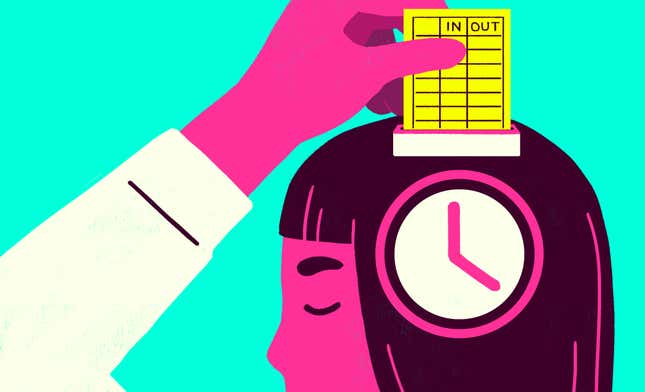
Taking time away from work when you’ve got the flu or a sprained ankle is not only expected, but encouraged. But mental health issues sometimes require time off, too.
雇主并不总是精神和对待physical health the same way, but taking care of yourself should be a priority for both you and your boss. Whether you’re in customer-service, communications, business, or teaching, your work quality is totally tied to your mental state. And while physical jobs like restaurant work, modeling, nursing, and agriculture are more explicitly dependent on manual labor, theyalsorequire plenty of mental work too.
In short: No matter the work, everyone needs a mental-health day off sometimes. But since the employment laws in the United States haven’t yet caught up with reality, here’s how to navigate the confusing messages we receive about health and the workplace.
How to Know You Need a Mental Health Day NOW
Meeting challenges and disappointments head-on is part of building personal resilience, so having a bad day at work doesn’t mean you should take the rest of the week off. But you should consider taking a mental health day:
- If your mental state is endangering yourself, the people you work with, or your clients or customers.A depressed, distracted pilot should not be flying a plane, and an overtired child-care worker shouldn’t be in charge of young kids. I wouldn’t want a burnt-out doctor performing surgery on me—would you? Ditto an angry driver getting behind the wheel of an 18-wheeler.
- If you’re so stressed you can’t focus.“If the thought of going to work fills you with dread, and when you’re there you can’t focus, take some time away,” advises Sherry Amatenstein, a Manhattan-based therapist and editor of the anthology, “How Does That Make You Feel?: True Confessions from Both Sides of the Therapy Couch.” She says that if you’re going through a major personal crisis—a bad breakup, or a death in the family—that can also be a time to take time off to care for yourself. “Ask yourself: What’s causing these intense feelings? Is this an ongoing thing? Or temporary? Listen to what’s going on inside,” Amatenstein says.
- If you fantasize about quitting.Strong emotions can be a warning about a problematic workplace environment. Time off helps you put the issues in perspective, and make a calm, rational decision about whether it’s best to start looking for a new job, or maybe have a conversation with your boss about problems you’ve been having with a coworker. It can be hard to know what the smartest course of action is in the middle of a workday when you’re frustrated and angry. A mental-health day can help you figure that out so you don’t make a rash decision.
What to Say to Your Boss
Last summer, web developerMadalyn Parker made headlinesfor emailing her colleagues to tell them she was taking sick days to use for mental health—and got praise from her boss for doing so.
But it’s worth keeping in mind that not all workplaces—or bosses—are so understanding. You want to ensure that you keep yourself employed, and protected by following the rules of your workplace.
It all depends on the workplace, but disclosing why you are taking time off might do more harm than good to your career.“Most employers would not consider a mental health day a sick day,” said Ruth Eisenberg, a DC-based lawyer and member of the National Employment Lawyers Association. She advises using sick days or personal days if you need a mental-health day‚ but not disclosing why exactly you’re taking the days off. They’re your days—you’ve earned them.
Eisenberg says you should always check your employee handbook to see exactly what kind of leave you have and how much notice is required to take it. “Even if you have sick or annual personal leave, there may be an advance notice requirement. And some employers are sticklers about that,” Eisenberg says.
However, there is an exception: “If you have a documented disability, such as depression or anxiety, you may have a right to take a mental health day as a reasonable accommodation of that disability,” says Eisenberg. That depends on what your treating physician or psychiatrist says though: They may mandate that you need time off for therapy visits or other care—some may even prescribe time off. Some disability rules are federal but other rules vary by state, and the size of your workplace, so if you suffer from a documented disability, familiarize yourself with your rights.
How to Plan a Mental Health Day
一种阻止崩溃或倦怠是助教ke your vacation time strategically. If you know you have a big project or presentation due, plan in advance to take time away from work after the job is done. If it helps to think of it as mental-health time off, consider it as such—whatever gets you to use all your vacation time will benefit your overall health.
But you don’t need a specific reason to take your allotted days off. Amatenstein says you should give yourself extra room in your schedule, and you can even plan that a year out. For example: “I know I want to try every few months or so to plan a long weekend,” she says, so she puts that time into her own schedule far in advance. The upside of this kind of scheduling is that on those tough days at work you can look forward to the days off, and you won’t surprise your coworkers by needing time off on short notice. You can also plan your own work around your days off so you won’t come back to a pile of tasks, which can feel overwhelming.
“There’s such a stigma around mental health, still. But we’re slowly moving to a place where it’s more accepted to talk about it,” said Amatenstein. Bosses and employees alike would do well to keep Madalyn Parker’s words in mind: Shetweeted: “Mental health is health.”
